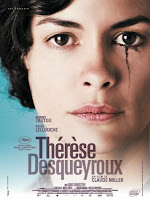Thérèse Desqueyroux - Review by Stu Coote
Thérèse Desqueyroux, the
latest film from Claude Miller, initially left me feeling irresolute in my
opinion of it. I walked away not entirely sure what it was I was feeling. But
the further I walked, the more I came to appreciate the subtleties of what it
had achieved; my contemplative response to it being chief amongst them. It’s a
film that really gets you thinking and stays with you long hours after the
credits roll. At first blush, it’s a tale filled with largely self-interested
characters that are difficult to sympathise with, but with time it blossoms
into a far richer human story.
Thérèse Desqueyroux is adapted
from the novel of the same name by Francois Mauriac. Set in 1926 rural France,
it centres on a marriage which unities the two wealthiest families of the
region. Thérèse (Audrey Tautou) weds Bernard Desqueyroux (Gilles Lellouche),
thus making them the richest pine farmers in the region. Thérèse, however, is
consumed by a lack of fulfilment and other assorted demons, and eventually
resorts to a desperate act in order to escape.
Originally, I struggled with the
fact that the characters weren’t particularly likable. That’s not to say they
weren’t engaging or entertaining, there just wasn’t much to latch onto.
This is the world of the extremely rich farm owners who are only
interested in maintaining their lifestyle. Thérèse is plagued by fact that she
wants a life in the city where she’ll have cafes, noise and meaning in her
life. Bernard only wants children. Their marriage is born out of a good
friendship, rather than any sense of longing or passion. It’s easy to see how
Thérèse would become so disheartened. I recently watched Gone With the Wind
for the first time and I was surprised that for a classic film I had a similar
reaction. There just weren’t any characters I could sympathise with.
Interestingly the two films share many things in common; a strong female lead,
alpha male performance and the rural background with all its customs and
traditions.
What I mistook for limited
character development was just my own initial laziness as a filmgoer. I’ve been
spoilt by heavy-handed Hollywood film-making; expecting character arcs to be
life changing ordeals to make impact. I often bemoan the fact that Hollywood
films spoon feed audiences and here I was not at first able to appreciate what
was before me. Whilst this film had a glacial pace at times, it oozed restraint
and control – qualities which I admire in a film maker. I found that I was
being allowed slow-release snippets of insight into the character’s feelings
and motivations, not only to move the plot forward but to expose more of their
natures.
I will forever see Audrey Tautou
as Amelie, thanks her iconic performance. She has an almost cartoonish quality
to her at times, maybe because of those big beautiful eyes but also in part to
how she carries herself. I enjoyed her playing something different to her usual
manic-pixie-dream-girl shtick. She explores very dark places and conveys the
inner turmoil that someone suffering from mental illness endures. Gilles
Lellouche, simply put, is a French Liam Neeson. He’s big, broad and brooding
with great screen presence. This is my first exposure to Lellouche and I would
like to track down a few more of his films just to see what else he can do.
Being set in the Landes Region
of France, which is the south west corner of the country, the landscape is
stunningly picturesque. There are several scenes of characters walking through
forests hunting rabbits and birdlife, adding to the overall rural flavour. The
costume design is fantastic; the individuals responsible certainly had a ball
dressing everyone in head-to-toe in fashions of the day. I loved the old
estates that were used, adding so much authenticity to the setting.
By no means am I under the
impression that this film is for everyone. It’s dripping with the flavours of
French cinema and at times can be slightly challenging, but this shouldn’t warn
you off. This is the film you trek all the way into Newtown for. So when you
come out of it you too can walk that long walk letting this beautiful little
number unveil itself to you.




Comments
Post a Comment
Thanks for taking the time to read and comment! Bill Murray says: YOU'RE AWESOME!